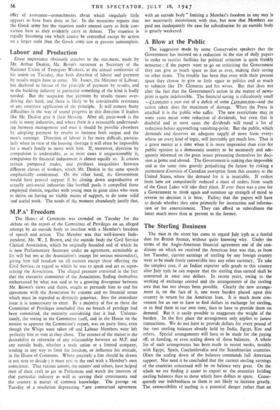A Blow at the Public
The suggestion made by some Conservative speakers that the Government has insisted on a reduction in the size of daily papers in order to restrict facilities for political criticism is quite frankly nonsense ; if the papers want to go on criticising the Government they can give as much space to that as ever, making their saving on other items. The trouble has been that even with their present space they choose to give so little space to politics and so much• to subjects like Dr. Clements and his wives. But that does not alter the fact that the Government's action in the matter of news- print is quite indefensible. The financial saving is ridiculously small —£2,000,000 a year out of a deficit of some L45o,000,000—and the action taken does the maximum of damage. When the Press is attacked it is the public who suffer. The new restrictions may in some cases mean some reduction of dividends, but even that is doubtful and in most cases the dividends will stand a lot of reduction before approaching vanishing-point. But the public, which demands and deserves an adequate supply of news from every- where on every kind of topic, will inevitably get much less. That is a grave matter at a time when it is more imperative than ever for public opinion in a democratic country to be accurately and ade- quately informed on the great issues presenting themselves for deci- sion at tiome and abroad. The Government is making that impossible and at the same time gravely prejudicing the future by risking a permanent diversion of Canadian newsprint from this country to the United States, where the demand for it is insatiable. If orders from here are compulsorily reduced a' mass of orders from south of the Great Lakes will take their place. If ever there was a case for a Government to think again and summon up strength of mind to reverse its decision it is here. Failinz that the papers will have to decide whether they exist primarily for instruction and informa- tion or for entertainment. They can afford to subordinate the latter much more than at present to the former.


































 Previous page
Previous page